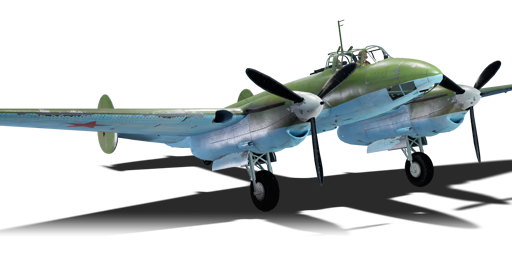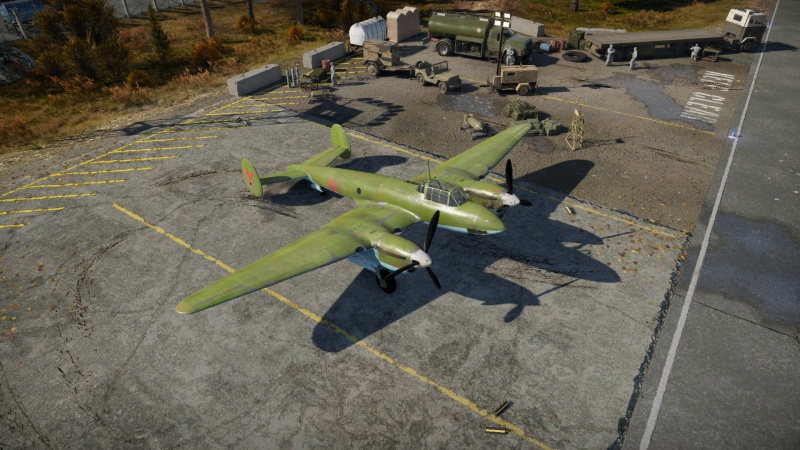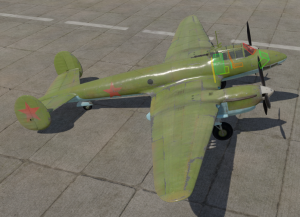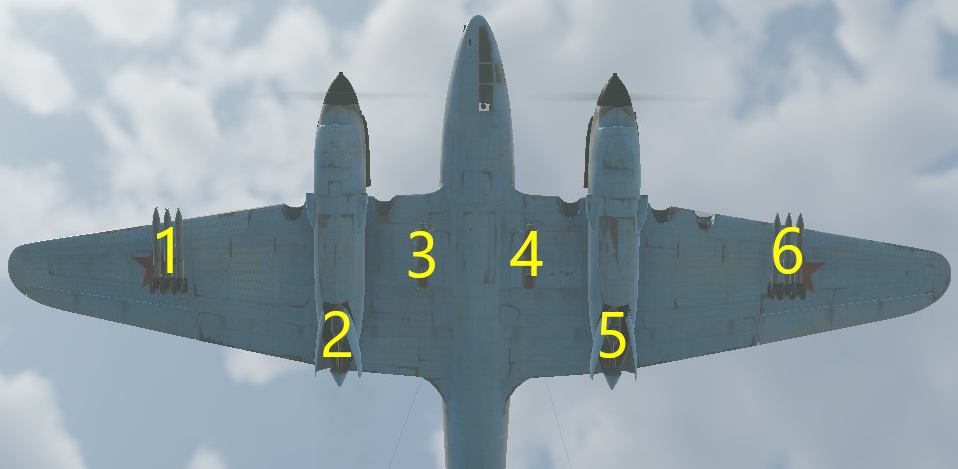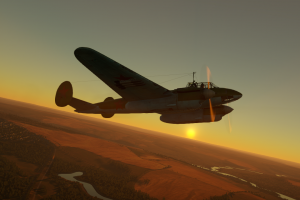Difference between revisions of "Pe-3bis"
(→Suspended armament: Updated) |
Colok76286 (talk | contribs) (Undo revision 174554 by U142791519 (talk)) |
| (One intermediate revision by one other user not shown) | |
(No difference)
| |
Latest revision as of 18:39, 15 October 2023
| This page is about the Soviet strike aircraft Pe-3bis. For other versions, see Pe-3 (Family). |
Contents
Description
The Pe-3bis is a rank II Soviet strike aircraft with a battle rating of 3.3 (AB), 2.7 (RB), and 3.0 (SB). It has been in the game since the start of the Open Beta Test prior to Update 1.27.
The Pe-3bis is the final aircraft in the Pe-3 family of strike aircraft, and shares similar characteristics with its other brethren. It features an impressive array of secondary weapons, making it an effective ground attacker. It can also be used in as an effective air-defence fighter and bomber hunter, taking advantage of its airspawn and powerful frontal armament. Overall, this aircraft is a great multirole fighter suitable for both Air and Mixed battles.
General info
Flight performance
The Pe-3bis has similar handling characteristics as its predecessor, the Pe-3. It isn't a very manoeuvrable aircraft, and has mediocre handling characteristics even for a twin-engined heavy fighter. The plane can attain a top speed of roughly 430 km/h at sea level when spaded, and up to 530 km/h at higher altitudes. This means that the aircraft is much slower than most enemy single-engine fighters and some of its twin-engined brethren (for example, the Me 410). The plane also has a slow climb rate, meaning that gaining altitude is always going to be a pain.
This aircraft benefits from having control surfaces that are relatively large and responsive. In particular, the aircraft's roll rate is actually quite satisfactory for an aircraft of its size. However, being a heavy fighter, the Pe-3bis suffers from relatively bad energy retention and turning capacity. The aircraft is equipped with leading-edge slats which can help improve manoeuvrability, but still cannot out-manoeuvre almost every single-engine fighter it faces at the BR. The aircraft suffers from slight control-surface lockup at higher speeds, but this isn't severe enough to prevent the aircraft from pulling out from a steep dive.
The aircraft's engines are another weak point, as their oil coolers are rather ineffective. As a result, the aircraft's engines will begin to overheat after just 30 seconds of WEP, even when spaded.
| Characteristics | Max Speed (km/h at 5,100 m) |
Max altitude (metres) |
Turn time (seconds) |
Rate of climb (metres/second) |
Take-off run (metres) | |||
|---|---|---|---|---|---|---|---|---|
| AB | RB | AB | RB | AB | RB | |||
| Stock | 512 | 495 | 8800 | 35.1 | 36.3 | 6.4 | 6.4 | 326 |
| Upgraded | 549 | 530 | 32.6 | 33.8 | 11.9 | 8.9 | ||
Details
| Features | ||||
|---|---|---|---|---|
| Combat flaps | Take-off flaps | Landing flaps | Air brakes | Arrestor gear |
| ✓ | ✓ | ✓ | X | X |
| Limits | ||||||
|---|---|---|---|---|---|---|
| Wings (km/h) | Gear (km/h) | Flaps (km/h) | Max Static G | |||
| Combat | Take-off | Landing | + | - | ||
| 740 | 450 | 500 | 470 | 320 | ~10 | ~5 |
| Optimal velocities (km/h) | |||
|---|---|---|---|
| Ailerons | Rudder | Elevators | Radiator |
| < 380 | < 380 | < 440 | > 307 |
| Compressor (RB/SB) | ||
|---|---|---|
| Setting 1 | ||
| Optimal altitude | 100% Engine power | WEP Engine power |
| 2,000 m | 1,100 hp | 1,186 hp |
| Setting 2 | ||
| Optimal altitude | 100% Engine power | WEP Engine power |
| 4,000 m | 1,050 hp | 1,132 hp |
Survivability and armour
- 6 mm steel plate in front of the pilot
- 7 mm steel plate in front / partially below the pilot
- 45 mm bulletproof glass in front of pilot
- 13 mm armoured seat for pilot
- 6 mm steel protecting sides of gunner cabin
- 10 mm steel underneath gunner
- 12 mm steel behind gunner
- Fuel tanks are located behind the gunner and in the wing, are self-sealing and feature a neutral gas pressurization system
This aircraft benefits from strong armour protection for both crew members, featuring 6-13 mm steel plating for the pilot cabin. As well, the pilot has a 45 mm bulletproof glass plate in the front of the aircraft. The fuel tanks in the wing can often survive fires due to their pressurization system.
However, the plane is still rather fragile. The central fuel tank (behind the gunner) is well-protected but can often cause structural failure if set alight. As well, the engines are unprotected and can easily be knocked out.
Modifications and economy
Armaments
Offensive armament
The Pe-3bis is armed with:
- 1 x 20 mm ShVAK cannon, nose-mounted (250 rpg)
- 2 x 12.7 mm Berezin UB machine guns, belly-mounted (265 rpg left + 230 rpg right = 495 total)
Suspended armament
The Pe-3bis can be outfitted with the following ordnance:
| 1 | 2 | 3 | 4 | 5 | 6 | ||
|---|---|---|---|---|---|---|---|
| 100 kg FAB-100sv bombs | 1 | 1 | 1 | 1 | |||
| 250 kg FAB-250sv bombs | 1 | 1 | |||||
| M-13UK rockets | 3 | 3 | |||||
| RBS-132 rockets | 3 | 3 | |||||
| Maximum permissible loadout weight: 720 kg Maximum permissible wing load: 360 kg Maximum permissible weight imbalance: 280 kg | |||||||
| Default weapon presets | |
|---|---|
| |
Defensive armament
The Pe-3bis is defended by:
- 1 x 12.7 mm Berezin UB machine gun, dorsal turret (200 rpg)
- 1 x 7.62 mm ShKAS machine gun, tail turret (250 rpg)
It should be noted that the 7.62 mm machine gun has a tiny firing arc making it almost useless in all engagements. Thus, the main line of defence of the Pe-3bis is its 12.7 mm machine gun. This weapon has decent coverage over the upper hemisphere, but cannot fire underneath the aircraft. As a result, the aircraft is completely undefended against attacks from below.
Usage in battles
The Pe-3bis is a very effective multirole aircraft that can be configured for a variety of missions. Firstly, the aircraft benefits from an airspawn, allowing it to reach the battlefield much faster. As well, the aircraft is decently-armoured and has great armament options, meaning that it can be used in both bomber-hunting and ground-attack roles. These two main paths will be discussed below:
Ground Attack:
Though initially configured as a bomber-hunter, the Pe-3bis benefits from a strong set of secondary payload options. These include up to 700 kg of bombs (2x250 kg mounted underwing and 2 x 100 kg in the engine-nacelle bays). The aircraft can also carry up to six RS/RBS-132 rockets for use against armoured ground targets. These secondary armaments make the aircraft very effective against ground targets.
In Air RB, one option is to bring the attack load and skim the ground, with the aim of reaching the ground targets as fast as possible. The 2 x 100 kg + 2 x 250 kg load is quite effective against hard targets, but can only hit 3 targets due to the 250 kg bombs dropping in pairs. The 100 kg bombs drop one-by-one out of each engine nacelle bay (don't forget to open the bomb bay before attacking), but have a smaller blast radius meaning that it will be harder to kill Tanks and pillboxes with it. The RS/RBS-132 rockets are very effective against harder targets, but take some time to get used to aiming - however, the RBS-132 lacks an explosive charge and typically does less damage. Take note that the rockets fire in pairs, meaning that you have three shots total (six rockets).
In mixed battles, the aircraft can be effectively used as a multirole aircraft, utilizing its strong armaments. The aforementioned rockets and bombs can be used to deal with tanks and harder targets - however, note that the 20 mm ShVak cannon can also be used against softer targets. The cannon is capable of penetrating 27 mm of armour when using Armoured Target belts, which is more than enough to deal with softer targets such as SPGs and SPAAs.
Bomber Hunter / Heavy Fighter:
The Pe-3 can also be used as a bomber hunter. The aircraft carries a decent frontal armament of 2 x 12.7 mm Berezin UB machine guns (located on the belly) and a 20 mm ShVak Cannon in the nose. Though not as powerful as the weapons found on its contemporaries (like the Ki-108, Mosquito or the Me 410), they are equipped with big ammo reserves and can easily deal with any air targets, whether large or small.
An ideal strategy is to begin side-climbing at the start of a match. Due to the Pe-3's relatively bad climb rate, the aircraft will take relatively long to get to altitude, though this is remedied by the aircraft's airspawn. Once at altitude, look for any bombers to destroy, and engage them first as the Pe-3's poor manoeuvrability makes it lacklustre when used against agile fighters. If there are no bombers to engage, feel free to Boom & Zoom on any unsuspecting fighters. However, never engage in a turnfight as the smaller, more agile fighters will quickly make short work of you. Note that you have access to a rear gunner, with an effective defensive turret. However, the bottom of the plane is completely unprotected (unlike the Pe-2) meaning that you cannot defend yourself against fighters approaching from below.
Specific Enemies worth noting:
- '[BV 238]] - The German mega-boat-plane is one common enemy that can be encountered in uptiers. Though slow, its formidable defensive armament will turn you into mincemeat if you stay on their tail for too long. When engaging this aircraft, approaching for a head-on is the best strategy, as the BV 238 only has a single quad turret at the front. Aim for the wings and engines, as they are much more vulnerable than the BV 238's fuselage.
- SB2C-4 - The Helldiver can often be encountered in uptiers flying at altitude. However, don't underestimate this plane as it wield a strong set of forward weapons that can be augmented with underwing gun pods (on the SB2C-4). Thus, don't take any head-ons as the SB2C's cannons can easily break a wing or set the engines on fire. Instead, dive on them when they're unaware, as the rear quadrant of the SB2C isn't well protected.
- Mosquito - The Mosquito, another twin-engined fighter that can be encountered, is also a dangerous enemy. It wields a quad pack of 20 mm Hispanos that will rip the Pe-3bis apart. As with the Helldiver, don't take head-ons. Instead, dive on them from the upper quadrant. Their airframe is fragile as it is made of wood, and will not take many hits.
Manual Engine Control
| MEC elements | ||||||
|---|---|---|---|---|---|---|
| Mixer | Pitch | Radiator | Supercharger | Turbocharger | ||
| Oil | Water | Type | ||||
| Controllable | Controllable Not auto controlled |
Not controllable Not auto controlled |
Controllable Auto control available |
Separate | Controllable 2 gears |
Not controllable |
Pros and cons
Pros:
- Decent frontal armament with large ammunition reserves
- Relatively sturdy, and can potentially survive some fires due to its self-sealing and pressurized fuel tanks
- Pilot and gunner are both fairly well protected
- Gets an airspawn in RB meaning that it can reach the battlefield much faster
- Can carry a decent amount of suspended ordnance making ground-pounding a viable option
Cons:
- Frontal armament isn't nearly as powerful as similar aircraft such as the Mosquito or Ki-108
- Ordnance options are rather limited and doesn't have access to heavy bombs (500 kg+)
- Lacklustre flight characteristics including poor manoeuvrability and slow top speed
- FAB-250 bombs and rockets drop in pairs, severely limiting the maximum amount of targets
- Aircraft lacks a ventral gunner, and the tailcone machine gun is essentially useless as a self-defence weapon
- Has a large minimum fuel option of 52 minutes - you'll almost never need that much fuel
- Terribly long turn time, even when fully upgraded; you will have a tough time manoeuvring
History
After the initial introduction of the Pe-3 fighter to frontline units, pilots reported several issues with the aircraft. Importantly, the flash from the forward guns frequently blinded the pilot, due to the aircraft's frequent use as a night fighter. As a result, the Petlyakov design bureau began working on an improved version of the Pe-3, called the Pe-3bis. The first prototype was developed in September and October of 1941.
The aircraft featured an improved main armament over the original Pe-3, now carrying a pair of 12.7 mm Berezin UB machine guns and a 20 mm ShVak cannon. The wing was equipped with leading-edge slats, and the fuel tanks were given a gas pressurization system using engine exhaust gases. Combat testing of the aircraft revealed additional problems - importantly, the nose-mounted machine guns still frequently blinded the pilot. As a result, a redesign of the weapons mountings led to the guns being moved underneath the fuselage, near the bomb bay location of the original Pe-2.
The new Pe-3bis aircraft began entering service in early 1942, serving alongside previous Pe-3 aircraft in reconnaissance, patrol and convoy escort missions. A single Pe-3 was captured by the Finnish, who renamed it the Pe-301 and used it as a reconnaissance platform as well. A total of 152 Pe-3bis aircraft were produced.
| Archive of the in-game description | |
|---|---|
|
Petlyakov Pe-3bis Heavy Twin-Engine Fighter. In April 1942, the Pe-3bis, an improved version of the Pe-3, began full-scale production. The most significant improvements concerned the main armament: a 20 mm ShVAK cannon with 250 rounds was installed in the nose fuselage section. Two 12.7 mm Berezin UBK machine guns were placed under the center wing section where the Pe-2's bomb bay once had been. The starboard gun had 230 rounds, whereas the port gun was given 265 rounds. A VUB-1 defensive turret was mounted at the navigator's station and had a 12.7 mm UBK machine gun with a pneumatic reloading system and 200 rounds. A 7.62 mm fixed ShKAS machine gun with 250 rounds was put in the tail cone. Various changes and improvements were introduced into the airframe structure and the plane's equipment. The wing panels of the Pe-3bis were equipped with automatic leading edge flaps. The crash pylon was removed from the crew cockpit to improve the navigator's working conditions, and the cockpit armour was reinforced. Only a part of the glazing on the nose fuselage section was left, namely a pair of narrow side blisters and a small navigator's porthole to aim when bombing. Blackout shutters were provided for the whole of the cockpit glazing. The nitrogen fuel tank pressurization system was replaced with one that used cooled inert gases fed to the tanks from the engine exhaust. Transferring the battery of guns to the center wing section required reduction of the capacity of fuselage fuel tank No. 7 by 100 liters. An asbestos bulkhead separated the tank from the machine guns and, at the same time, protected the weapons from dripping gasoline. 121 Pe-3bis aircraft were built in 1942. The industry provided the front lines with 13 more planes at the beginning of 1943. Due to the relatively small production volume, different changes were introduced occasionally in the Pe-3bis design and were subsequently applied to full-scale production Pe-2s, if these changes had proven to be effective. The following items appeared and were tested on production Pe-3bis planes: a VUB-1 upper turret, a new canopy for the pilot's cockpit, increased forward projection of the main landing gear legs, an advanced fuel supply system, and an inert gas fuel tank pressurization system. An attempt to resume the production of Pe-3 fighters was made at the beginning of 1944. For a variety of reasons, this version of the fighter did not meet the Air Force's requirements. Its armament was outright weak: one 12.7 mm UBK machine gun in the nose fairing and only one 20 mm ShVAK cannon in the center wing section. Since the DEU-1 remote-controlled defensive mount which had been planned for installation was not ready, two DAG-10 grenade launchers with AG-2 aerial grenades were fitted in the rear fuselage section, instead. Due to the aircraft's obvious non-compliance with the requirements of the specification, only 19 production Pe-3 planes of this variant were built. Pe-3/Pe-3bis fighters were in service only with the Air Force of the Workers' and Peasants' Red Army and naval aviation. As part of the Air Force of the Northern Fleet, several planes outlasted the war and served until 1946, and the final Pe-3s survived up to the beginning of the 50s. | |
Media
- Skins
- Images
See also
Aircraft of a comparable role, configuration or era:
External links
| V.M. Petlyakov Design Bureau (Опытное конструкторское бюро Петлякова) | |
|---|---|
| Fighters | Pe-3 (e) · Pe-3 · Pe-3bis |
| Bombers | Pe-2-1 · Pe-2-31 · Pe-2-83 · Pe-2-110 · Pe-2-205 · Pe-2-359 · Pe-8 |
| USSR strike aircraft | |
|---|---|
| IL-2 | IL-2 (1941) · IL-2 (1942) · IL-2M (1943) · IL-2M type 3 · IL-2M "Avenger" · IL-2-37 · IL-2 M-82 |
| IL-8 | IL-8 (1944) |
| IL-10 | IL-10 · IL-10 (1946) |
| Pe-3 | Pe-3 (e) · Pe-3 · Pe-3bis |
| Su-2 | BB-1 · Su-2 MV-5 · Su-2 TSS-1 · Su-2 (M-82) |
| Su-6 | Su-6 · Su-6 (AM-42) · Su-6 (M-71F) |
| Su-8 | Su-8 |
| Tandem MAI | Tandem MAI |
| TIS MA | TIS MA |
| Tu-1 | Tu-1 |
| Yak-2 | Yak-2 KABB |


